Key takeaways:
- Selective mutism is a complex anxiety disorder affecting a child’s ability to speak in specific social settings, requiring a supportive environment to foster communication.
- Building effective communication skills, including active listening and non-verbal cues, can help individuals in overcoming barriers to expression.
- Small victories in social interactions can significantly boost confidence and should be celebrated as part of the journey toward better communication.
- Support systems, professional guidance, and practical resources play a crucial role in managing selective mutism and enhancing communication skills.

Understanding Selective Mutism
Selective mutism is often misunderstood; it’s not simply a choice to remain silent but rather a complex anxiety disorder that affects a child’s ability to speak in certain social situations. I remember a time when my friend, who faced this challenge, would light up when talking to his family but seemed to vanish into silence around peers. Isn’t it fascinating how one can feel such comfort and yet be gripped by unease in different environments?
When I first learned about selective mutism, I was struck by how it can severely impact a child’s confidence and social interactions. I once observed a child in a classroom setting who wanted desperately to participate but was paralyzed by the fear of judgment. How often do we underestimate the weight of anxiety that can stifle one’s voice?
Understanding selective mutism requires recognizing the profound emotional struggles behind the silence. I’ve seen firsthand how essential it is for caregivers and teachers to create a nurturing atmosphere that encourages gradual steps towards communication. Have you noticed how a little patience and understanding can open doors for those who are often unheard?
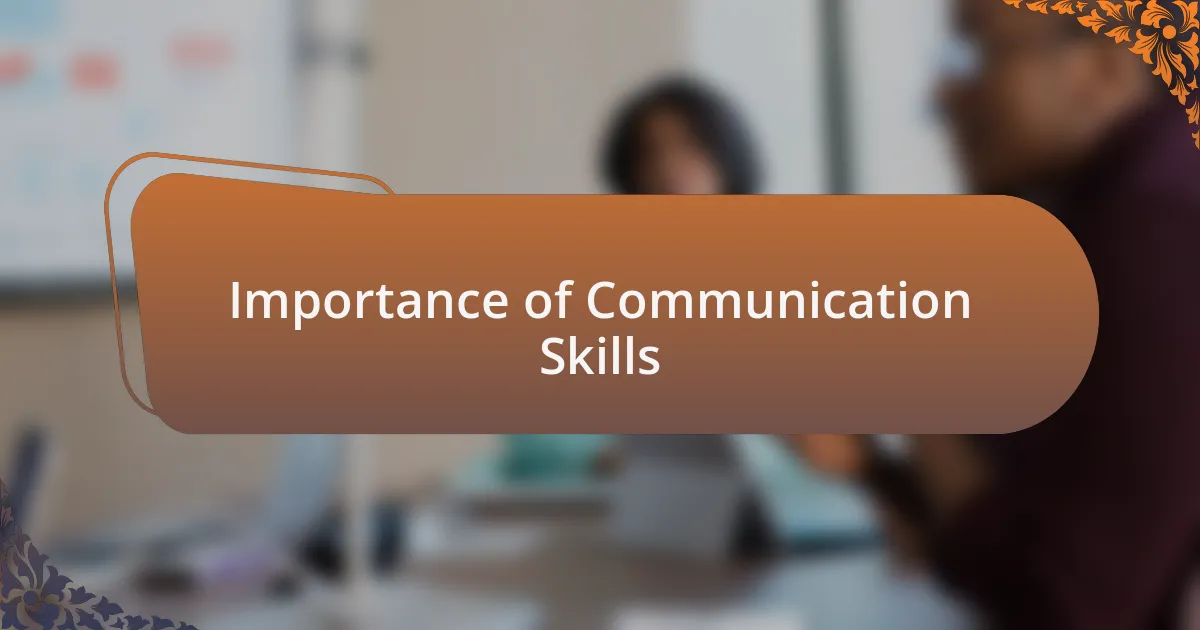
Importance of Communication Skills
Communication skills are not just about speaking; they shape the way we connect with others. I recall a moment when I attended a workshop on effective communication. The facilitator emphasized that even a single word can bridge a gap or create a chasm in relationships. Have you ever noticed how a sincere compliment or a well-timed question can transform an interaction?
Mastering communication also builds confidence, especially for those facing challenges like selective mutism. I once watched a shy teenager blossom during a supportive group discussion, where they found their voice among peers. It was a beautiful reminder of how vital it is to foster environments where everyone feels safe to express themselves. Isn’t it heartwarming to see someone take that brave step toward sharing their thoughts?
Moreover, good communication skills pave the way for empathy and understanding. During a conversation with a friend who struggled to articulate their feelings due to anxiety, I learned just how powerful listening can be. I’ve come to appreciate that by attentively engaging, we not only hear words but also the emotions behind them. What if we all practiced this more, nurturing connections that thrive on openness and care?
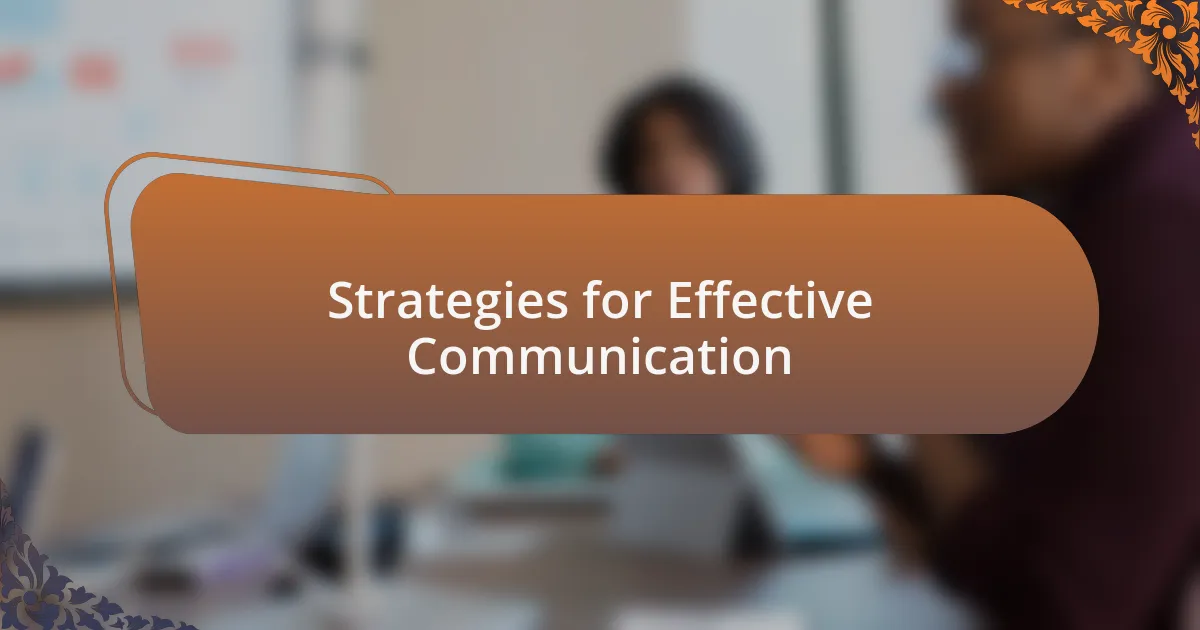
Strategies for Effective Communication
Effective communication often involves non-verbal cues, which can be incredibly powerful. I remember a time when I attended a gathering, and a friend who usually struggled to speak used gestures and facial expressions to convey her thoughts. It was such a revelation to witness how much one can communicate without uttering a single word. Have you ever found yourself understanding someone just by the way they looked at you?
Another strategy is to create a comfortable environment for open dialogue. I’ve had experiences where simply rearranging seating to face each other made conversations flow more easily. When people feel physically connected, it often translates into emotional openness. How do you think your surroundings impact your willingness to communicate?
Lastly, practicing active listening can significantly enhance communication. I’ve learned that by genuinely focusing on what others say—like nodding or summarizing their points—I not only validate their feelings but also encourage them to express themselves further. This exchange often leads to deeper conversations. What techniques do you think could help in your conversations to foster better understanding?
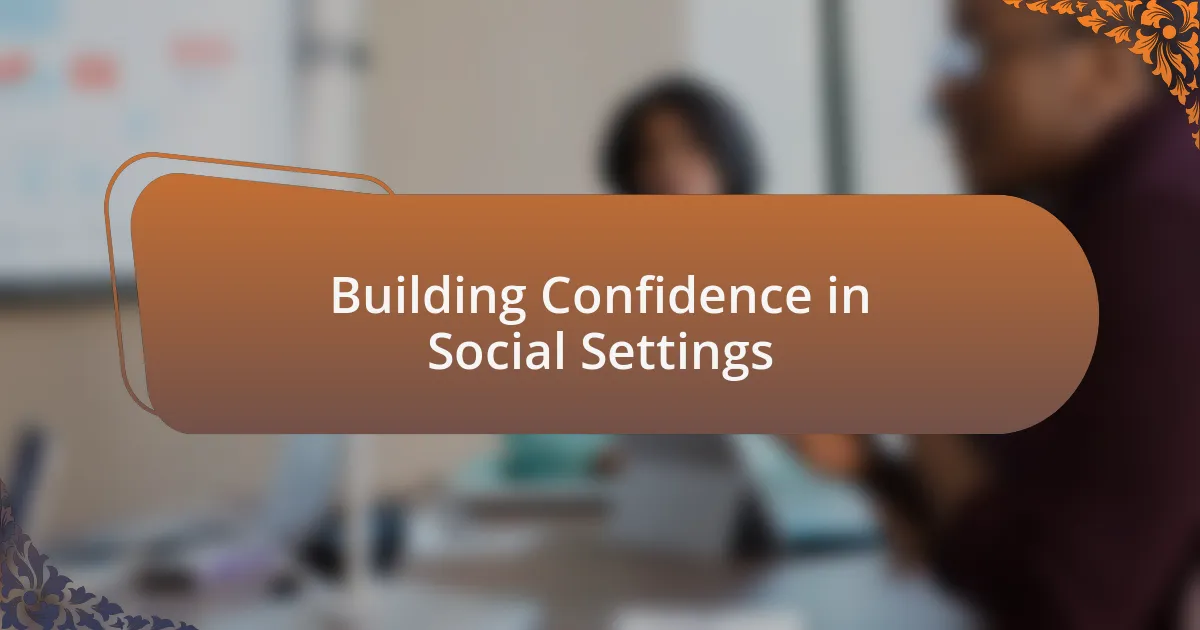
Building Confidence in Social Settings
Building confidence in social settings can sometimes feel daunting, especially when you’re initially faced with a room full of unfamiliar faces. I recall feeling overwhelmed at a networking event where I had to push myself to initiate conversations. I took a deep breath and began with a compliment about someone’s shoes, which surprisingly led to a lively discussion. Can you remember a time when a small gesture made a big difference in your interactions?
Engaging in role-playing scenarios with a trusted friend has also been instrumental for me. Practicing potential conversations not only eases the pressure but builds familiarity with social interactions. I vividly remember rehearsing a dialogue before a family gathering, and when the actual moments arrived, I felt significantly more at ease. Have you ever tried role-playing to prepare for a social situation?
It’s essential to remember that mistakes are part of the journey. Embracing those awkward moments—as I learned to do—can shift your perspective. I once blurted out an unrelated comment during a discussion, but instead of feeling embarrassed, I laughed it off, and it surprisingly brought everyone closer together. How do you approach the inevitable slip-ups during social interactions?

Personal Experiences with Selective Mutism
When I think back to my experiences with selective mutism, one memory stands out vividly. I was in a classroom setting, surrounded by peers, and my heart raced as I struggled to raise my hand for a simple question. It was in those moments of silence that I felt the weight of expectation and anxiety. Have you ever been in a situation where words just wouldn’t come, no matter how hard you tried?
One day, a teacher approached me and offered a quiet, encouraging smile that felt like a lifeline. She gently prompted me to express my thoughts in writing instead of speaking aloud. That small act of understanding helped lessen my anxiety and opened the door to communication. How has support from others impacted your ability to express yourself?
Over time, I learned that small victories mattered most. I remember the first time I spoke up during a group project, my voice shaky but determined. The sense of accomplishment in that moment was indescribable. Have you celebrated your milestones, no matter how small, on your journey to better communication?
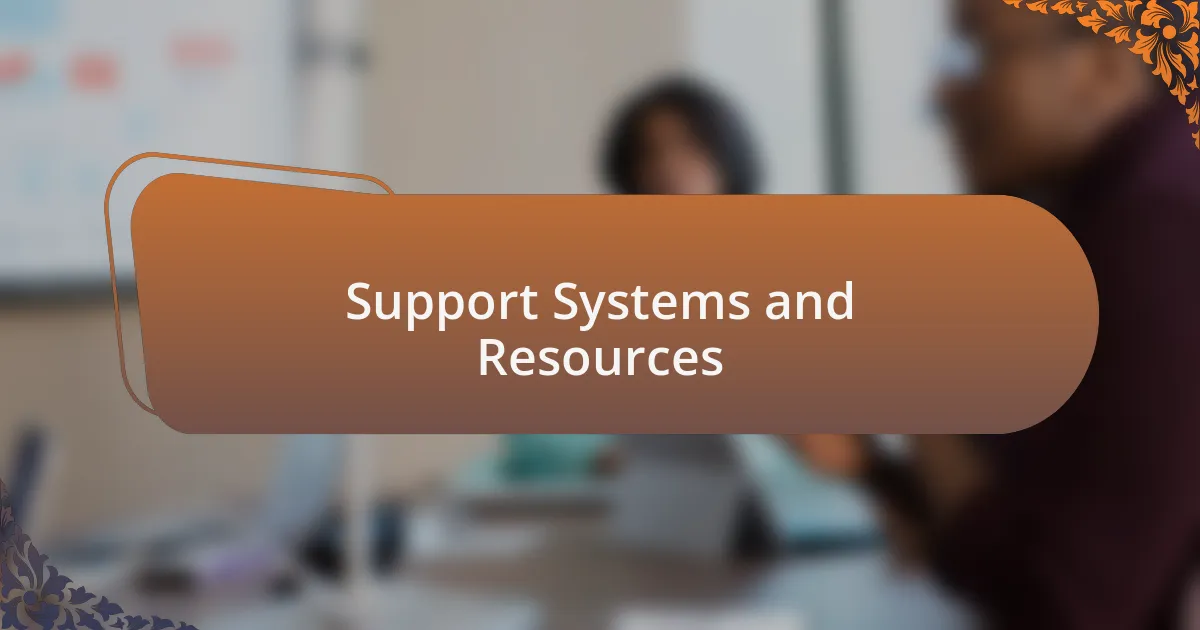
Support Systems and Resources
Finding support systems has been crucial in my journey with selective mutism. I remember attending a local support group where I connected with individuals who truly understood my struggles. Listening to their stories made me realize that I wasn’t alone. Have you ever found comfort in knowing others share your experiences?
In addition to peer support, I sought resources that provided practical guidance. Books dedicated to selective mutism offered techniques for easing anxiety during social interactions. For instance, one suggestion was to practice role-playing conversations, which I found surprisingly helpful. What strategies have you experimented with to improve your confidence in communication?
I’ve also encountered professionals who have made a significant impact. My speech therapist created a safe space for me to express myself at my own pace. It was in those sessions that I learned not just to speak, but to trust my voice. How have the right professionals helped shape your communication journey?
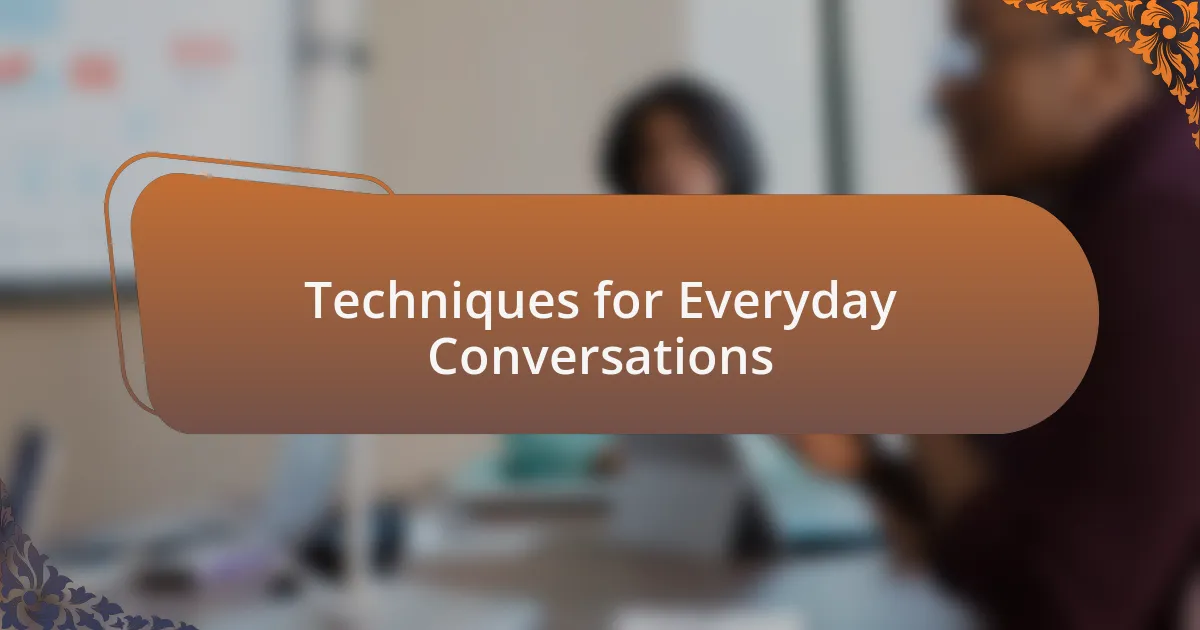
Techniques for Everyday Conversations
Practicing everyday conversations can feel daunting, but I’ve found that starting small makes a huge difference. For example, I often initiate brief chats with baristas or cashiers about the weather or a new product. It’s a low-pressure way to engage and build my confidence bit by bit. Have you tried striking up casual conversations with strangers in your day-to-day life?
Another technique that has helped me is focusing on listening as much as speaking. I realized that by truly tuning in to others, I not only took the spotlight off myself but also became more comfortable in the conversation. This subtle shift made me feel more connected and less anxious about what I would say next. Have you noticed how active listening can transform a dialogue?
Lastly, I’ve learned the power of non-verbal communication. Simple gestures, such as nodding or smiling, help me convey interest without overwhelming myself with words. Once, during a family gathering, I communicated my engagement by participating more through expressions rather than speech, and it felt liberating. What non-verbal cues do you find most effective in your interactions?